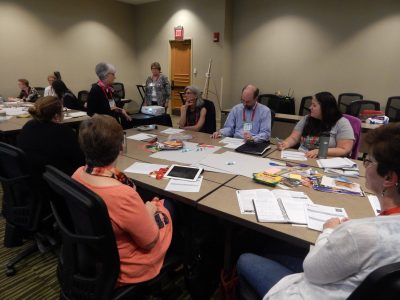Disrupting institutional power: Imagining a regional model for public history education
09 March 2018 – Denise Meringolo

NCPH Annual Meeting, Indianapolis, 2017. Photo credit: NCPH
As the number of public history programs continues to grow, public history educators compete for students, grants, and partners. We flood cultural organizations with interns and redundant projects. Budgetary uncertainty forces educators working in state systems to make competing claims of primacy and excellence, pitting our programs against one another.
Is there another way?
The NCPH2018 working group “Disrupting Institutional Power” aims to identify models of cross-institutional collaboration and propose pilot projects to test regional approaches to public history education.
The working group’s six facilitators are connected with state public history initiatives in Illinois and in Maryland. In response to specific conditions in their home states, they have begun to experiment with and consider opportunities for cross-institutional cooperation. Facing a devastating budget crisis during which at least one public history program has been shuttered, faculty teaching in the Illinois State University system have been working to minimize competition and demonstrate the broad civic value of public history education. They recognize cross-institutional collaboration as a tool that might not only attract students and build better history programs, but also strengthen a variety of public history institutions across the state, including academic programs, public libraries, and local museums. What is good for the field, they argue, is good for the university system, and vice versa. The situation in Maryland is less dire, but universities struggling to attract students are unnecessarily replicating programs and flooding the cultural marketplace with students whose skills and interests do not match organizational needs. In Maryland, open forums like Bmore Historic, an annual un-conference, enable public history faculty to come together with staff from a variety of cultural institutions to identify better strategies for project development and partnership.
We have designed this working group as a space to communicate with colleagues from across the country who have faced similar issues. We plan to identify, document, and create potentially productive models for collaborative public history education.
Prior to our meeting in Las Vegas in April, we will engage in an online conversation here: http://denisemeringolo.org/category/ncph-2018/
Please feel free to join us on the blog and in person to help identify historical examples, contemporary models, and innovative proposals for developing public history education across traditional institutional lines.
Facilitators:
Denise D. Meringolo, University of Maryland, Baltimore County
Betsy Nix, University of Baltimore
Eli Pousson, Baltimore Heritage
Kathryn Oberdeck, University of Illinois at Urbana-Champaign
Devin Hunter, University of Illinois Springfield
Anke Voss, The Urbana Free Library



